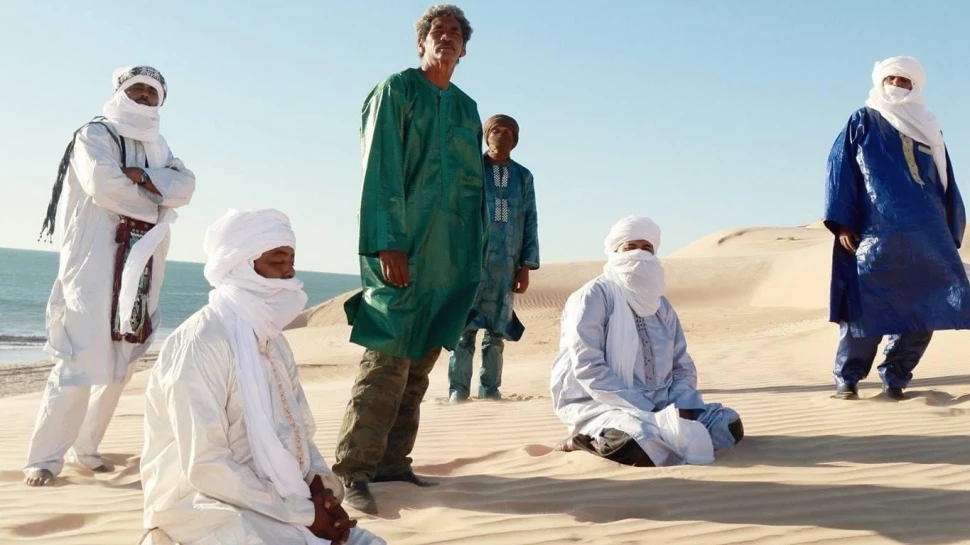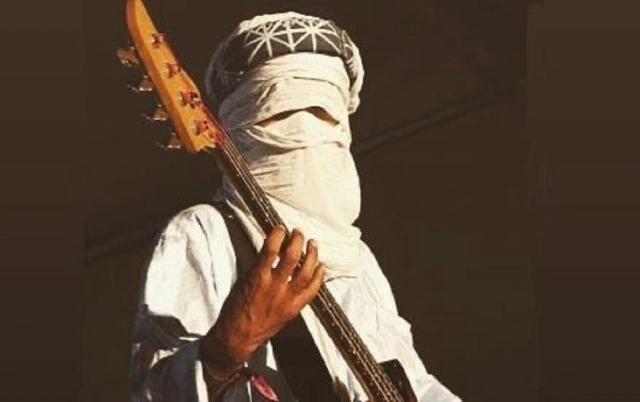"Tinarween".. Tuareg music spreads the culture of the desert people in the world

in Brussels or Essaouira, in New York or Copenhagen, whether the weather is mild or snowy; The members of the musical group "Tinarween" stand in their desert clothes, and the veil from which their eyes shine with feelings of sadness and anger, they open their performances with a phrase that is repeated in every concert for them; Welcome to The Desert.
The Libyan writer Ibrahim al-Koni says in the novel “Anubis”: “The desert is for the body an exile, but the desert is for the soul a paradise.” A sentence that applies to the members of the "Tinarween" group, which in the Tuareg language means "deserts." This band carries with it the spirit of the desert wherever it goes. What is the story that the members of "Tinaroen" hide and expose their words?
"Sixty-three" .. The founder of the band laments his father
After the end of the French colonization of Mali in 1960, the Tuareg revolution began, "because we are free men." This is how "Yado", a member of the group, describes the nature of the message that illuminated the path of "Tinariwen" in their artistic path, as everything has a military significance in the Tinariwen group.
In the song "Soixante Trois", the founder of the group, Ibrahim Ag al-Habib, mourns the memory of his father, who was executed by the Malian authorities after the Tuareg rebellion, and the lyrics of the song say: In 63 he is gone, but he will return, those days are gone and left a trail, they killed the old legend and the child just He was born, they ravaged the pastures and wiped out the cattle, in the year 63 he is gone, but he will return.
This song chronicles a catastrophic stage for the Tuareg, as they fell victim to a political division of their lands between the African countries that gained independence from France, and the nature of their travels; These Tuareg found themselves in a stateless diaspora, and their lands were distributed among Mali, Niger, Algeria, Mauritania and Libya.
Among those forcibly displaced, and among the refugee camps in southern Algeria; There were two people, Ibrahim Ag Al-Habib and Hassan Ag Al-Tohamy, who discovered the magic of the electronic guitar in the eighties, and with this discovery the first indications of the nucleus of the "Tinaroen" group appeared.
"Tinaroen"... From an armed struggle to a musical revolution
In light of the diaspora that the Tuareg suffered among the refugee camps, the invitation came from Libya when the late Libyan President Muammar Gaddafi promised to arm and train the Tuareg, by establishing a military camp for them, and the “Tinarween” boys joined the camp, and there was a meeting with the third member of the group, Abdullah Ag Al-Husseini in a year 1986.
Between the bullets of the revolution that broke out in northern Mali and Nigeria in 1990; Officially written is the birth document of the "Tinarwen" group, whose members participated in the revolution, and witnessed the abuses inflicted on their people.
The armed conflict ended with the signing of peace agreements between the Tuareg, Mali and Niger, so "Tinaroen" withdrew from the battlefields, to carry its struggle with it to the battlefields.
Each resistance faction has its own band.
Instead of their firearms for guitars, Tinaroen musicians engage in a greater struggle to convey their people's message to the world, through a musical blend that combines traditional Tuareg music with the fast rhythm of guitar. They sing about exile and revolution, and about the daily livelihood of their people, continuing their struggle to liberate and restore their lands and make their voice for the world.
Ag Al-Husseini says: Every resistance faction in the world has its own orchestra composed of members who are musicians and resistance fighters at the same time. They play the role of a military fighter, as they are militarily trained and know martial arts, and at the same time have an artistic spirit that has an important value, because they can express a lot. He describes themselves as "warrior artists".
The message of art... a march crowned with the highest music awards
The team members prefer to categorize themselves in the category of art over the category of military, believing that art is more important than armed struggle, and that their message can be spread with a global resonance.
The resonance of Tinariwen's music remained local, and hardly exceeded Mali, until the French musical group "Logo" arrived in Bamako, the capital of the country, at the end of the nineties to record its album "Bohemie de Cristal", and there the meeting took place between "Logo" and "Tinaroen", and it was decided to revive the work of Tinariwen. Joint technician in France.
"Tinaroen"'s path towards the world began to emerge and with a story full of struggle, it started with two local albums in 1983, then the first international album in 2001 entitled "Radio Tesdas". 2011 for the album "Tassili".

The veil worn by the members of the musical group "Tinarwen", from which their eyes appear, radiating feelings of sadness and anger
The proud people of the desert.. a culture that conquers harsh obstacles
In 2003, the German car industry giant "Volkswagen" issued a four-wheel drive car called "Volkswagen Touareg". The proud desert, which embodies the ideal ability of man to conquer the harsh obstacles of the earth, to this day they have been able to maintain their strong personality, and their self-reliance.
They are called the Tuareg or the Tuareg, and this name is derived from a valley in Libya called leaving, according to some specialists, and they are spread in the Sahara between Mali, Niger, Chad and Algeria, they speak the language of "Tamashek", and they sanctify their traditional clothes, you hardly see a man of them without a veil or "Taklmost" in their language.
The Libyan writer Ibrahim al-Koni spoke about them in his novel “The Bleeding of the Stone”, and described how the mouth of the Tuareg man is naked, and it is shameful for his wife’s family or a strange woman to see him, and unlike the man, the woman does not hide the features of her face.
Tuareg music is one of the most important ambassadors of this tribe. There were many bands that brought the way of life and art of this people to the world, such as the “Katinaroin”, “Imran”, “Tamecrest” and “Bambino”, and several other musicians who can only be counted in the fact that they preserve The traditional dress of the Tuareg in any ceremony they celebrate in different parts of the world.
The goddess "Amnai"... Female sanctification in Tuareg society
The Tuareg see themselves as a legend, not just a system. For them, the desert is a nursery for the legends with which they dig into the depths of history, and derive their existence and survival, such as the legend of the city of Wau, the legend of bull skin, and the legend of the gods “Amnai” associated with the female rescuer.
This legend reveals the extent of sanctification that the Tuareg gave to the female before its gradual disappearance after the Tuareg embraced monotheistic religions. It takes place in the bride's house, and she is free to choose her husband and ask for a divorce.
The Tuareg have three symbols that they revere and strictly preserve, which are “Tenri”, “Terha” and “Iman”, which means “desert, love and life”, and because women are the origin of love, they play an essential role. Historical, such as the warrior Lalla Fatima N’Soumer, who is the most prominent face of the Algerian resistance, this veneration may be heard and felt at times when the throat of the band member “Mina Walit” shouts with a desert woman’s grouse with her leadership and movements on the stage that makes you aware of something about the value of women in Tuareg society.
"The owner of the desert boasts of belonging to nothingness"
Tinariwen is the band whose music discovery was likened by Robert Plant, founder of Led Zeppelin, to the public appearance of Christ to mankind. And the Kalashnikov full of bullets, the language of the desert and liberation.
In the "Tinariwen" videos on the YouTube platform, some dispute the comments about their country's eligibility for "Tinariwen", as some say that the band is financial, while others see that it is Algerian, and others say that it is from Niger, but the missing piece in this conflict that Ibrahim al-Koni mentions (One of the most important writers of the desert) by saying, "The owners of the homelands brag about belonging to the homeland, and the owner of the desert brags about their belonging to nothingness."
https://doc.aljazeera.net/%D8%AA%D9%82%D8%A7%D8%B1%D9%8A%D8%B1/%D8%AA%D9%8A%D9%86%D8%A7%D8%B1%D9%88%D9%8A%D9%86-%D9%85%D9%88%D8%B3%D9%8A%D9%82%D9%89-%D8%A7%D9%84%D8%B7%D9%88%D8%A7%D8%B1%D9%82-%D8%AA%D9%86%D8%B4%D8%B1-%D8%AB%D9%82%D8%A7%D9%81%D8%A9-%D8%B4/?fbclid=IwAR0QivhzF-czSs-mCrINS08S2dHysNt1pMFHx5Ut3hziULgFiBgPP7295Gk

